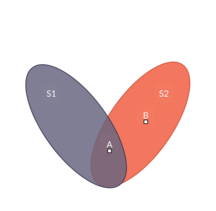Association fallacy
When it is an attempt to win favor by exploiting the audience's preexisting spite or disdain for something else, it is called guilt by association or an appeal to spite (Latin: argumentum ad odium).[1] Guilt by association is similar to ad hominem arguments which attack the speaker rather than addressing the claims, but in this case the ill feeling is not created by the argument; it already exists.This form of the argument is as follows: An example of this fallacy would be "My opponent for office just received an endorsement from the Puppy Haters Association.[4] The argument runs thus: Galileo was ridiculed in his time for his scientific observations, but was later acknowledged to be right; the proponent argues that since their non-mainstream views are provoking ridicule and rejection from other scientists, they will later be recognized as correct, like Galileo.[8][9] It is often committed by those whose theories reject common scientific consensus.
Guilt by AssociationGenetic fallacyinformal fallacyAccident (fallacy)formal logical fallacyad hominemset theoryfirst-order logicEuler diagramsyllogisticpostal serviceNashvilleGalileoCarl SaganChristopher ColumbusWright brothersBozo the ClownCommon purposeDiscriminationJumping to conclusionsMotte-and-bailey fallacyNine familial exterminationsPrejudicePresumption of guiltPropaganda techniquesReductio ad HitlerumScapegoatingSippenhaftSocial stigmaStereotypeMyth of the flat EarthGorski, DavidfallaciesFormalpropositional logicAffirming a disjunctAffirming the consequentDenying the antecedentArgument from fallacyMasked manMathematical fallacyquantificational logicExistentialIllicit conversionProof by exampleQuantifier shiftSyllogistic fallacyAffirmative conclusion from a negative premiseNegative conclusion from affirmative premisesExclusive premisesNecessityFour termsIllicit majorIllicit minorUndistributed middleInformalEquivocationFalse equivalenceFalse attributionQuoting out of contextLoki's WagerNo true ScotsmanReificationCircular reasoningBegging the questionLoaded languageLeading questionCompound questionLoaded questionComplex questionCorrelative-basedFalse dilemmaPerfect solutionDenying the correlativeSuppressed correlativeIllicit transferenceCompositionDivisionEcologicalSecundum quidAccidentConverse accidentFaulty generalizationAnecdotal evidenceSampling biasCherry pickingMcNamaraBase rateConjunctionDouble countingFalse analogySlothful inductionOverwhelming exceptionAmbiguityAccentFalse precisionMoving the goalpostsSlippery slopeSorites paradoxSyntactic ambiguityQuestionable causeAnimisticFurtiveCum hocPost hocGambler'sInverseRegressionSingle causeTexas sharpshooterLaw/LegalityProof by assertionConsequencesArgumentum ad baculumWishful thinkingEmotionChildrenFlatteryNoveltyRidiculeIn-group favoritismInvented hereNot invented hereIsland mentalityLoyaltyParade of horribles